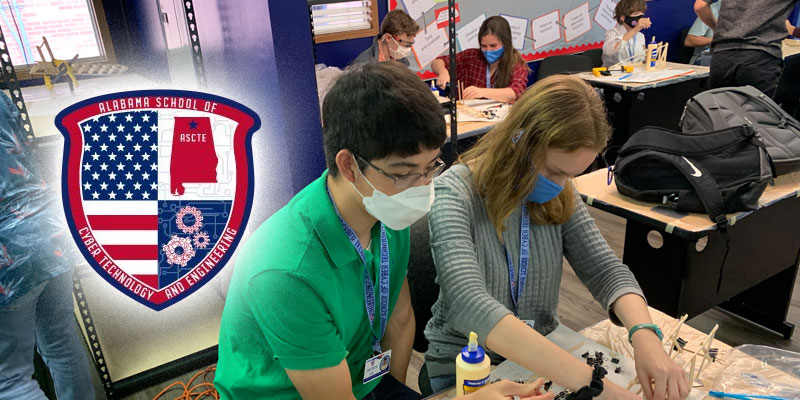Why STEM Education Is Critical for Alabama's Next Generation of Innovators
In today's rapidly evolving world, science, technology, engineering, and mathematics (STEM) are at the core of the most innovative advancements. From cutting-edge technology to solving global challenges like climate change and healthcare, STEM fields are pivotal in shaping the future. For Alabama, investing in STEM education is not just important—it’s essential. By equipping students with the knowledge and skills to thrive in STEM-related careers, the state can foster a new generation of innovators who will drive economic growth, technological advancements, and global competitiveness. In this blog, we explore why STEM education is critical for Alabama’s future, how it can transform the state’s economy, and the steps being taken to ensure the next generation is well-prepared for the challenges of tomorrow.

1. STEM Education as the Foundation for Innovation
.jpg)
Alabama has a rich history in manufacturing, engineering, and agriculture, but as industries continue to evolve, the demand for highly skilled professionals in STEM fields grows. By focusing on STEM education, Alabama can provide its students with the skills to excel in industries like aerospace, cybersecurity, biotechnology, and renewable energy—fields that are transforming the modern economy.
The Role of Innovation in Economic Growth
Innovative technologies developed by STEM professionals can lead to new industries, which directly impact job creation. Alabama’s growing sectors such as aerospace and automotive manufacturing rely heavily on advancements in engineering, robotics, and data analytics. By fostering a culture of STEM education, the state will have a competitive edge in attracting businesses and talent, boosting economic growth and job opportunities.
2. Preparing Students for High-Demand Careers

The job market is changing rapidly, and traditional jobs are being replaced or transformed by automation, artificial intelligence, and other technological advancements. STEM education equips students with critical problem-solving, analytical, and technical skills that are essential for navigating these changes.
High-Paying Jobs and Career Opportunities in STEM
STEM careers offer some of the highest-paying job opportunities in the nation, and Alabama is no exception. With sectors such as aerospace, defense, manufacturing, and healthcare expanding rapidly, there is a significant demand for skilled workers in these fields. For example, Alabama’s aerospace industry, centered around major players like Airbus and Boeing, is one of the fastest-growing in the U.S. Offering students access to quality STEM education will ensure they are prepared to fill these high-paying roles, reducing the skills gap and attracting global companies to invest in Alabama.
Closing the Skills Gap
One of the challenges faced by Alabama, as well as other states, is the skills gap in the workforce. Many STEM jobs require specialized training, but a shortage of skilled workers often leads to job vacancies in critical sectors. By investing in STEM education from an early age, Alabama can equip its students with the skills needed to meet the demands of the modern workforce, ensuring they are competitive on a global scale.
3. Driving Economic Diversification in Alabama

Alabama has long been known for its automotive and manufacturing sectors, but the state is also diversifying its economy. STEM education plays a critical role in this diversification by nurturing a workforce that can thrive in emerging industries like renewable energy, healthcare technology, and digital infrastructure.
Renewable Energy and Clean Technology
As the world moves towards more sustainable energy solutions, Alabama can lead the way in clean technology and renewable energy innovation. The state has vast natural resources, including wind and solar power potential, which can be harnessed through cutting-edge engineering and scientific research. By integrating STEM education into its schools, Alabama can produce the next generation of engineers, scientists, and innovators who will help the state transition to a clean energy economy.
Healthcare Innovation and Biotechnology
Alabama is home to a growing healthcare and biotechnology sector, with institutions like the University of Alabama at Birmingham (UAB) making significant strides in medical research. STEM education is crucial in training the next generation of healthcare professionals, biotechnologists, and medical researchers who will lead the state’s efforts in developing new treatments, improving patient outcomes, and advancing medical technologies.
4. Fostering Critical Thinking and Problem-Solving Skills

At its core, STEM education emphasizes critical thinking, creativity, and problem-solving. These skills are essential not only in STEM careers but in all aspects of life. Students who engage in STEM learning are encouraged to ask questions, think analytically, and approach problems from multiple angles.
Building Stronger Communities through STEM
STEM education also promotes a deeper understanding of how things work and the importance of finding solutions to real-world problems. For example, students who learn about environmental science might come up with innovative solutions to reduce waste or conserve water—solutions that can directly benefit their communities. By encouraging young people to think critically about the world around them, Alabama can build a more informed, innovative, and solution-oriented society.
5. Expanding Access to STEM for Underrepresented Groups

One of the key goals of STEM education in Alabama is to ensure that all students, regardless of background, have equal access to STEM learning opportunities. Historically, women, minorities, and students from rural areas have been underrepresented in STEM fields. By providing access to quality STEM education, Alabama can foster a more diverse and inclusive STEM workforce, which has been shown to drive innovation and creativity.
Empowering Girls and Minorities in STEM
Programs designed to inspire and encourage girls and minorities to pursue STEM careers are crucial to breaking down barriers and building a more diverse workforce. Schools, community organizations, and universities across Alabama are increasingly focusing on outreach programs that engage underrepresented students and provide them with the resources and mentorship they need to succeed in STEM fields.
6. The Role of Alabama’s Schools, Universities, and Tech Initiatives

Alabama’s commitment to expanding STEM education can be seen through the numerous initiatives and partnerships that are taking place across the state. Schools and universities are working together to provide innovative STEM programs, and initiatives like the Alabama Math, Science, and Technology Initiative (AMSTI) are designed to equip educators with the tools and resources needed to teach STEM subjects effectively.
Alabama’s Investment in STEM Education
The state has also made significant investments in STEM education at the university level. Institutions like Auburn University, UAB, and the University of Alabama offer world-class research opportunities in STEM fields. These universities are not only training the next generation of scientists, engineers, and medical professionals, but they are also contributing to the state’s growing reputation as a hub for innovation and research.
Tech Incubators and Startups
Alabama has seen the rise of several tech incubators and startup hubs, such as Innovation Depot in Birmingham, which support budding entrepreneurs and innovators in the tech industry. These hubs offer mentorship, funding, and resources to help young companies grow and thrive, contributing to the state’s broader tech ecosystem.
Conclusion
As the world continues to change, Alabama’s future depends on its ability to foster a new generation of thinkers, innovators, and problem-solvers. STEM education is crucial for the state to remain competitive, diversify its economy, and provide high-quality, well-paying jobs to its citizens. By investing in STEM from an early age, Alabama can create a culture of innovation that benefits its economy, its people, and its future.
To ensure Alabama’s next generation is ready for the challenges ahead, it’s essential that we continue to expand access to STEM education, invest in teacher training, and support programs that inspire young people to pursue careers in science, technology, engineering, and mathematics. The future of Alabama’s economy—and the world—depends on it.







